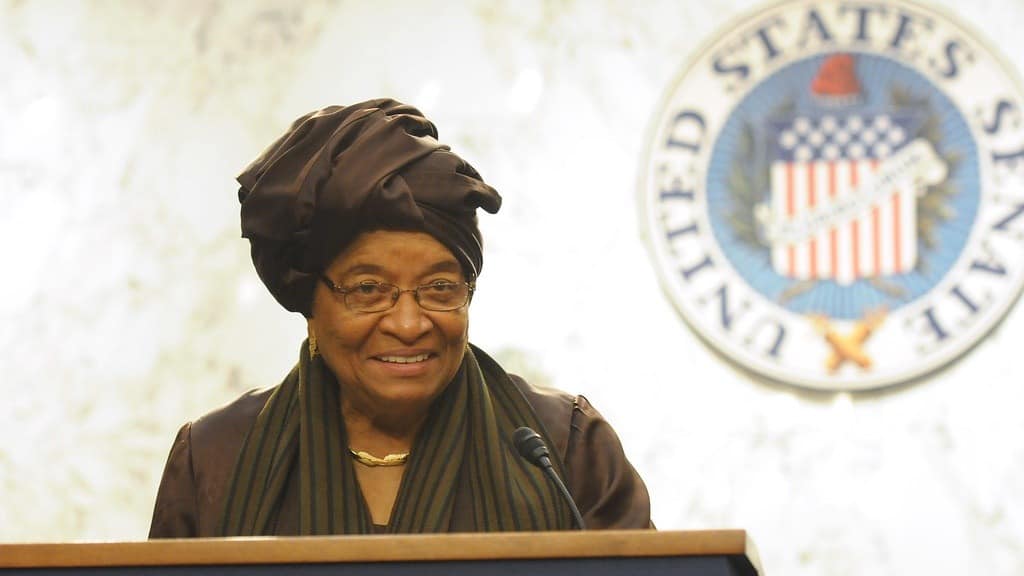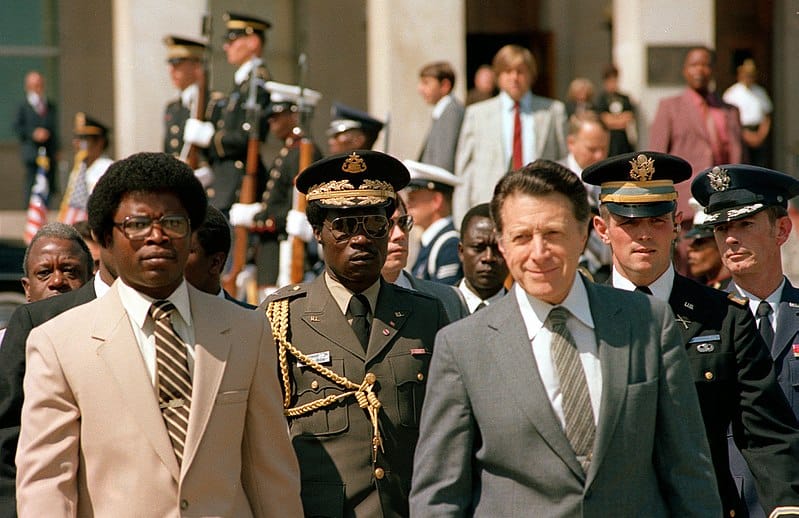On November 12, 1985, exiled General Thomas Quiwonkpa invaded Liberia through Sierra Leone to launch a coup against President Doe. Across the country, Liberians celebrated Quiwonkpa’s challenge to the fraudulent results of the 1985 Presidential Election. Hours later, those hopes were crushed as soldiers in the Armed Force of Liberia (AFL) captured Quiwonkpa and defeated his forces. People watched in horror as members of the AFL dismembered Quiwonkpa’s genitals in front of the USAID building and paraded them around the streets of Monrovia.
After the failed coup, Doe imprisoned many opposition leaders, including future president of Liberia, Ellen Johnson Sirleaf. Ambassador Moses Hopkins was determined to prevent the continuation of ritual cannibalistic killing of political prisoners. He directed every Foreign Service Officer, including USAID officer Mary Kilgour, to pass along a message to their contacts in the Liberian government. They stated that the United States would respond to any attempt on the prisoners’ lives. Although she describes those months in Liberia as “scary,” Kilgour admired the Liberians for being long suffering with a good sense of humor.
After serving in the Peace Corps, Mary Kilgour began her career at USAID in 1966 in the Regional Bureau for Africa working to eliminate smallpox. She served in Pakistan, Colombia, Costa Rica, the Philippines, Liberia, and Bangladesh before retiring as a Career Minister. In her oral history, she recounts some of the challenges that she faced as one of the few female Mission Directors during her time at USAID.
Mary Kilgour’s interview was conducted by John Pielemeier on March 14, 2018.
Read Mary Kilgour’s full oral history HERE.
Drafted by Lydia Laramore
Excerpts:
“It was pretty evident that Doe had cooked the vote to win and so a coup was taken out very shortly thereafter and Quiwonkpa was the leader of the coup.”
The corrupt election of 1985: Meanwhile there was an election early, a few months after I got there. That was a wonderful experience. I was an election observer, as were many of the AID mission and embassy people. The Liberian people were joyous at the opportunity to cast their ballots; the only problem came in the counting. The people charged with that, which included some fairly prominent people in town such as the minister of health, were sequestered in the Hotel Africa and kept there for long after they should have been able to count votes physically. Apparently there was some question of who actually won.
Q: Who were the main candidates, do you remember?
KILGOUR: There were two: Jackson Doe and Gabriel Kpolleh, in addition to the sitting president, Samuel Doe.
Q: This is the presidential election?
KILGOUR: Yes, presidential. It was pretty evident that Doe had cooked the vote to win and so a coup was taken out very shortly thereafter and Quiwonkpa was the leader of the coup.
Ellen Johnson Sirleaf was in country at the time. Ellen ran for the presidency in 1997, of course, and she lost then and ran again the next time and won. But she didn’t run in 1985. She was just a part of the opposition, and was arrested along with many other senior people. People who had a longer memory in-country than I did remembered 1980 when they arrested all the ministers and then executed a lot of them on Redemption Beach.
And so, everybody was worried that that would happen again when Quiwonkpa was killed.
“. . . they did kill Quiwonkpa and I learned later that Doe had forced the cabinet members to eat parts of him.”
A failed military coup and a ritual killing: . . . it was sort of scary. They had a lot of roadblocks and you could hear guns booming in the distance. And Quiwonkpa was caught and was being taken to Doe’s mansion in a truck that stopped in front of the AID building. A couple of the men looking through binoculars said that they had dismembered his private parts right there in front of the AID building. I didn’t personally see that, thank God.
Anyway, they did kill Quiwonkpa and I learned later that Doe had forced the cabinet members to eat parts of him. One of the cabinet members himself told me that story later, the ritual killing kind of eating. And so, things were bottled up after that. We couldn’t move around very much, we couldn’t go outside of Monrovia for a while.
“The ambassador asked everybody who had senior government contacts to go to them and make representations that if anything happened to Ellen and the other people who were political prisoners that the Americans would be very unhappy and would have to respond.”
Protecting political prisoners: And one of our radio stations got in trouble. The leader of the whole radio program announced that Quiwonkpa had won, so he was called in on the carpet. But he was well connected and wasn’t thrown in jail or anything. But people like Ellen and several others were, such as the minister of health, Martha Bellah. That gave me the first strictly diplomatic function that I performed because as you know, when you get into the senior ranks of AID basically you have a diplomatic function as much as an AID function. But this was the first time I fully realized that.
The ambassador asked everybody who had senior government contacts to go to them and make representations that if anything happened to Ellen and the other people who were political prisoners that the Americans would be very unhappy and would have to respond. So I went on a Saturday morning and I talked to the ministers of finance and planning and the Central Bank governor. It was interesting because I wasn’t too skilled at this. Maybe I was well trained by the Filipinos because I was very indirect in the way I did it. And I ended up showing up on a Saturday morning at somebody’s office saying I need to talk with them. I started chit chatting for the first half hour before I got to the main message. And of course, they were all very careful about how they responded because their lives were also at stake. If they had run afoul of Doe they were in danger. But anyway, I passed the word. And Ellen actually publicly on TV announced that the Americans saved her life by their representations to the senior people around Doe. And the ambassador went directly to Doe. So, I thought that was a pretty interesting experience.
“She was at her home, but under house arrest, and she was afraid she was going to be picked up again. So a missionary plane smuggled her out of the country.”
The aftermath of the coup: After that Ellen and the others were released. She was at her home, but under house arrest, and she was afraid she was going to be picked up again. So a missionary plane smuggled her out of the country. She went to Abidjan, and then back to Washington or New York, I’m not sure. She didn’t surface again in Liberian politics except on the margins. I’m sure she was talking to all the donors and the opposition all the time.
. . . . So, I left Liberia, but, as I said, I went back in ’97 from retirement for the election of Charles Taylor, and attended his inauguration and saw Grace Minor again. She was very deeply involved with him. I went to her chophouse and had a meal with her, and that was an interesting experience. Fortunately, Ellen didn’t win because she would have been dead within a month if she had won. She got 10 percent of the vote; Charles Taylor got 90 percent, basically because people wanted peace and they knew if he didn’t get elected he wouldn’t allow the peace to come.
TABLE OF CONTENTS HIGHLIGHTS
Education
BA in Political Science, University of Connecticut 1958-1962
MA in Political Science, University of Connecticut 1964-1966
Joined USAID 1966
Lahore, Pakistan—Assistant Program Officer 1967-1969
Bogota, Columbia—Assistant Program Officer 1970-1972
San Jose, Costa Rica—Deputy Mission Director 1978-1981
Manila, The Philippines—Deputy Mission Director 1981-1985
Monrovia, Liberia—Mission Director 1985-1988


